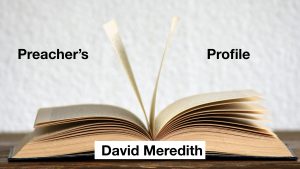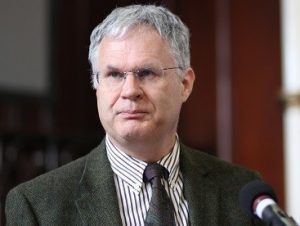Proclaimer Blog
Preacher’s Profile [David Meredith]
This is the sixth in our Preacher’s Profile Series. This time we asked David Meredith, the Mission Director for the Free Church of Scotland some questions about his life and preaching ministry.

David Meredith, Mission Director for The Free Church of Scotland
based in Edniburgh. After graduation from University of Strathclyde in English and Politics and Edinburgh Theological Seminary I planted a church in Smithton, Inverness. Smithton grew into a large multi-staff resource church in the course of a  31 year long ministry. I’m married to Nina and have 4 grown-up children. My hobbies revolve around the internal combustion engine, I have a large motorcycle and sports car which my friends tell me should belong to a hairdresser.
31 year long ministry. I’m married to Nina and have 4 grown-up children. My hobbies revolve around the internal combustion engine, I have a large motorcycle and sports car which my friends tell me should belong to a hairdresser.
When did you preach your first sermon and how long have you been preaching?
I preached my first sermon in a little country preaching station at Arnisort, Isle of Skye in 1980 and have been preaching since then. The first text I preached on (it was all texts in those days) was Romans 1:16, ‘For I am not ashamed of the gospel, because it is the power of God that brings salvation to everyone who believes: first to the Jew, then to the Gentiles.
What was your journey to preaching ministry?
While attending church in Glasgow as a student I was under the ministry of Donald MacLeod. One evening he preached from the text 2 Timothy 1:6, ‘you should stir up the gift that is within you.’ I preached in various small churches throughout my undergraduate days and then studied at ETS, Edinburgh.
Describe the congregation/setting you regularly preach to.
These days I am an itinerant but I’m also involved in the preaching team at Cornerstone, Edinburgh. It’s essential that any itinerant is rooted and involved in a local church. The experience of preaching to a congregation where you are not the pastor is unusual, it is certainly a different dynamic.

What are you currently preaching on/through?
Because I’m no longer in a local church situation I get to choose the passage which is a nightmare. I don’t want to be typecast as a ‘mission preacher’, not least because the story of the whole Bible is the story of mission.
What is your regular rhythm of sermon preparation, your usual process and how you schedule it in during the week?
I have a variety of administrative, teaching and speaking engagements during the week but I still try to keep Thursday mornings and Fridays clear. I never prepare on Saturdays. I read the passage through, on a photocopied sheet I will mark out significant words, phrases and ideas. I will then read various commentaries and write out an outline. It’s at this point I will go on the screen and start to write. Illustartion and application points will come at this point. The process will take 6 to 8 hours for each sermon.
What is your drafting/editing process that you go through in finalising your sermon for Sunday?
I have no editing process. What I have written, I have written! Although I use notes I am not bound to them which enables an editing process ‘on the hoof’. A sermon is a dynamic experience where the central theme and teaching remains but one adjusts according to circumstances.
What script/notes do you take into the pulpit?
I use an iPad and I will have usually 4/5 A4 pages of quite full notes but never a full manuscript.
What is your routine before preaching on a Sunday?
I love to get up early, get on my own and spend time with the Lord. The spiritual element is literally vital. I am a believer in the idea of thoroughly well prepared exegetical work but also reliance on the Holy Spirit and unction. Unction is not the same as shouting or cultivating the grand style, it’s deeper and more subtle than that. The debate between word and Spirit is such a soul destroying argument, what God has joined together, let no man pur asunder.
What feedback structures do you utilise in improving on your preaching?
I am not precious about my preaching and I’ve adopted a mindset of life-long learning. I used to use a mentor who was a very experienced and excellent preacher. These days I seek counsel and feedback from colleagues. I’m probably moving from a grand style to a calmer, more conversational approach.
What areas are you currently seeking to develop in your preaching?
Clarity, brevity and simplicity. It is critical to get some good application and illustration to make the sermon memorable. A sermon should be like bread, there is the sense that it is fresh. As I develop I want to speak more of Christ which I iught tio have done more of in my younger days.

What do you do on the days your preaching did not go very well?
I lick my wounds, recognise that my pride and ego need to be punctured but realise that it’s not the end. I aim at a degree of consistency and so the measure of what is ‘good’ and ‘bad’ can be highly subjective. God can bring healing from spit and clay and he can use my mess to His glory. It’s not about us.
What one piece of advice would you pass on to someone starting out as a preacher?
Listen with the ears of the congregation. It is not about ‘you’ so we need to communicate to the people who are in front of us but also the people we would like to be in front of us.
What are some of the best resources you have found on preaching?
I have read all the books but I also enjoy listening to masters of the craft. I listen to all the usual suspects but 2 preachers whjo I appreciate are largely unknown. David Turner is a layman, a church warden at All Souls. He is a lawyer and one of the best organisers of sermons I know. I also appreciate John Sartelle, a close friend and former senior minister at Independent Presbyterian Church, Memphis, TN. He encapsulates the word/Spirit balance.
